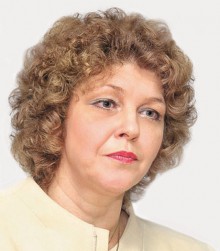On the eve of the book Ave: The Centennial of Pavlo Skoropadsky’s Hetmanate being launched at the Publishers’ Forum in Lviv, The Day asked Oxana Pachlovska, who is a writer, culturologist, professor at the La Sapienza University of Rome, as well as our contributor and friend, to tell us about her expectations from that event. We also asked Pachlovska, who lives and works in Italy and received the Shevchenko Prize for her collection of essays Ave, Europa! in 2010, whether Ukraine was becoming better understood in Europe.
Professor, you have long contributed to our publications, also with texts that appeared in the books of Den’s Library series. What are your expectations of Ave: The Centennial of Pavlo Skoropadsky’s Hetmanate? How important is this topic, in your opinion?
“Ave: The Centennial of Pavlo Skoropadsky’s Hetmanate covers not just one theme, but many. And among them, the most important one, in my opinion, is the quality of statesmanship and also the historical responsibility of anyone who ever dares to be a politician – today, in the past, and always. I mean responsibility not as a rhetorical figure, but as that dangerous dimension where a decision of one person, a document signed by them may determine the fates of millions, as those warm waves of human life turn into rivers of blood. Skoropadsky is to a large extent a symbol of Ukrainian contradictions, a personification of contrasts which have accompanied Ukrainian state-building efforts for centuries. It is therefore even more important to study Skoropadsky not only as a figure of the past, but also as an Archive of events, concepts, and decisions which offer forecasts that must be re-read in a new way every time.
“Actually, I want to emphasize the FORECASTING value of Den’s Library books. Cultural journalism itself is an extremely effective instrument of interpretation that links scholarship with society, takes scholarship from its ivory towers into various perception spaces, and implants academic knowledge into the living matter of public consciousness. It is during this period that I want to mention two Den’s books, which Larysa Ivshyna deliberately and systematically conceived and prepared for publication: Return to Tsarhorod (2015) and My Sister Sofia... (2016). Today, as Ukraine is waiting for the Tomos granting autocephaly, we need to recall these books which speak about the Ukrainian Orthodoxy as part of the European civilization, and books about the possibility of the Orthodoxy existing in the coordinates of the European culture in general. It was a great work done in advance of today’s milestone event – the ‘return’ of Ukraine to Tsarhorod/Constantinople, the restoration of the Rome-Constantinople civilizational axis, the collapse of the ‘Third-Roman’ parody of Rome, and the revival of Kyiv as one of the centers of the global Christianity.”
Today, we Ukrainians are trying to understand ourselves, our history, rediscover its lost layers even harder than before. Are we becoming better understood in Europe? In this context, we would also like to learn what is the current level of interest in Ukrainian studies? Is working in this area a challenge?
“Are we becoming better understood in Europe? This is another field of eternal Ukrainian paradoxes. The answer is both ‘yes’ and ‘no.’ On the one hand, there is a colossal demand for knowledge of Ukraine in Europe today, made even more urgent by the shortages of specialists, sources, institutions which are now felt stronger than ever. Russia’s assault on Ukraine is taking place under conditions of a major crisis afflicting the democratic system. These two events are so closely linked that history has literally pushed Ukraine into the forefront of Europe’s struggle to renew democracy and rediscover itself. Now, not only the future eastern border of the EU, but also the many categories and meanings that are being created today in the intellectual field, where a new identity of Europe is emerging, depend on Ukraine’s movement westwards.
“On the other hand, the potential and pressure of anti-European forces has increased enormously in this same Europe. Their power and influence are increasingly felt in the field of information. This information is deliberately doctored so as to convince the average European that some kind of incomprehensible and uninteresting ‘civil war’ is going on in faraway Ukraine.
“On the other hand, Ukraine itself often displays the ineffectiveness of diplomatic, cultural, and information institutions that should counteract these trends. Or, more precisely, these institutions are, to use an Italian saying, ‘the skin of a leopard’: some of them work, others do not, while some pretend to work. Information, complete with its dangers and fakes, manipulations and simulacrums, is a neuralgic ganglion of the modern world. Great risks lie here for Ukraine, and the political awareness of these risks in the corridors of power is dramatically low and inadequate overall.
“So, interest in Ukrainian studies is increasing, but it constantly faces new challenges while the old ones have not yet been overcome. Therefore, working in this area is both a daily challenge and a challenge going into the future. However, nobody promised Ukraine an easy journey home, to Europe, in the days of a modern barbarian invasion. We need to make this journey. With dignity. Clearly realizing the harsh realities. Firmly choosing our route.”







